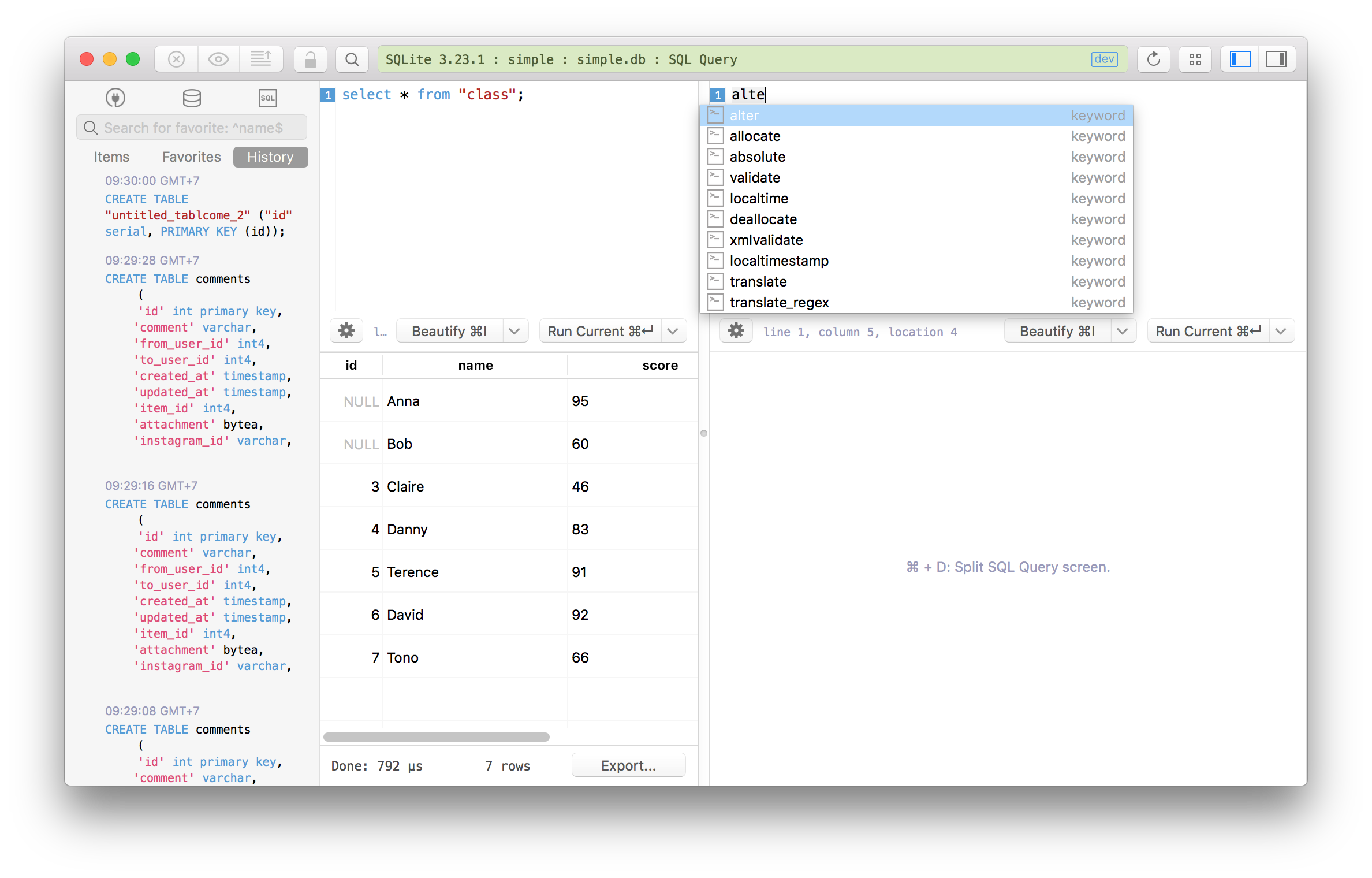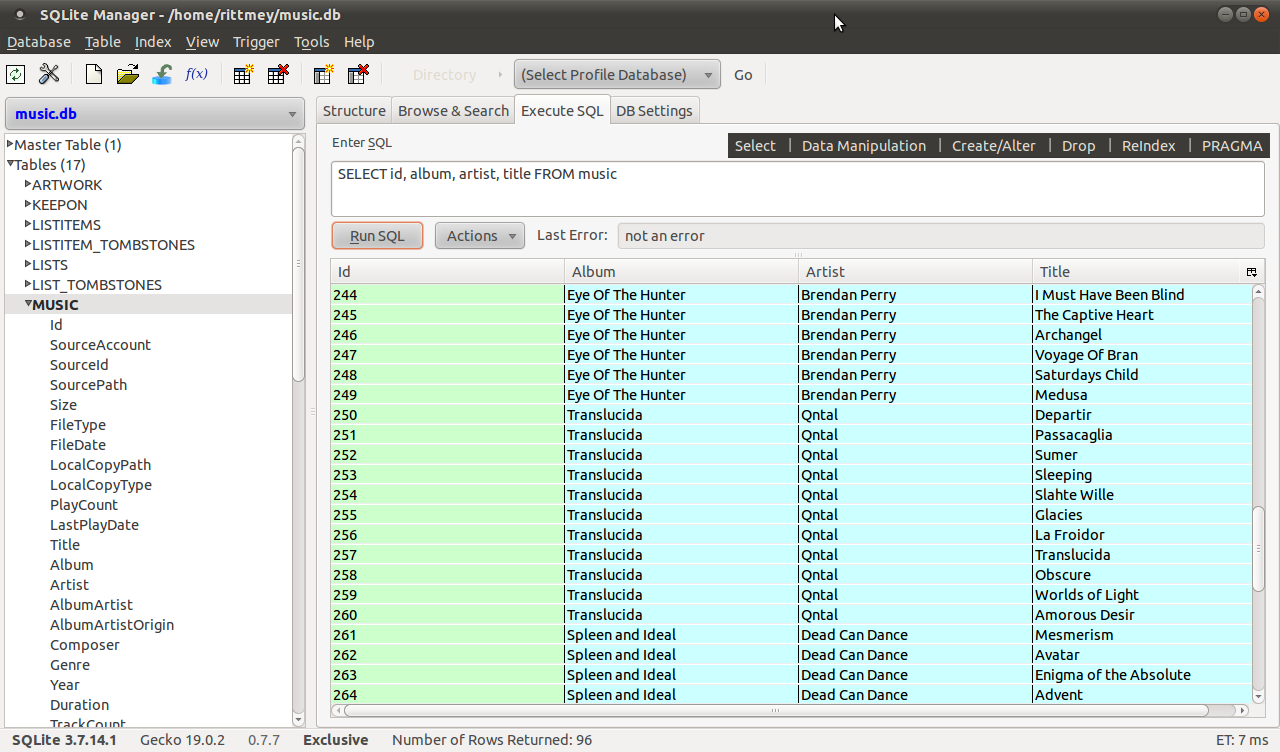
SQLite, therefore, hasn’t any source files. And we do not need to deploy, launch, or terminate the server operations.
Sqlite like download#
We don’t even have to download SQLite while utilizing it because of the virtualized framework. SQLite can also be used in any context, particularly in embedded systems. Please show your love and support by sharing this post.“SQLite only requires an adequate operating system or additional library support. This would have performance issues, especially for larger tables. Therefore, it ends up doing a full-scan going through all rows and converting them to upper or lower case (depending on the function you use) before doing the comparison. SQLite does not make use of an index when using UPPER() or LOWER() functions. WHERE LOWER(`title`) = LOWER('lorem ipsum') WHERE UPPER(`title`) = UPPER('lorem ipsum') We could use UPPER() or LOWER() function on both sides of string comparison so that we have the same case on either side. Making the Compared Strings the Same Case Using LIKE operator may have performance issues, especially for large tables, as SQLite will do a full-scan of the rows unless the column you're using LIKE on has a COLLATE NOCASE index. Therefore, for English characters we could use LIKE for case-insensitive comparison like so:Īnd for non-english characters we could use a unicode-aware LIKE (for example, from the ICU extension). # output: SEARCH TABLE post USING INDEX IDX_BLOG_POST_TITLE (title=?)Īs evident from the example above, when COLLATE NOCASE index is present, the query does not scan all rows.Ĭase-Insensitive Comparisons With the LIKE Operatorīy default, the SQLite LIKE operator is case-insensitive for ASCII characters (which covers all english language letters), and case-sensitive for unicode characters that are beyond the ASCII range. However, with the index added, we get the following output with EXPLAIN QUERY PLAN: To demonstrate this, let's do EXPLAIN QUERY PLAN on our query:ĮXPLAIN QUERY PLAN SELECT * FROM `blog_post` WHERE `title` = 'lorem ipsum' Īs you can see in the example above, SQLite does a full-table scan and visits all rows in the table when we don't have an index.

Sqlite like full#
Without a COLLATE NOCASE index, our queries will do a full table scan. To optimize lookups, we can create an index with COLLATE NOCASE for the column with case-insensitive strings. For example, the following query will do a case-insensitive comparison now as the column itself is defined as COLLATE NOCASE: Now, we won't have to explicitly use COLLATE NOCASE in our queries.

Title VARCHAR(25) NOT NULL COLLATE NOCASE WHERE `title` COLLATE NOCASE IN ('lorem ipsum', 'fusce vitae')Īlternatively, we could declare the column itself as case-insensitive by adding COLLATE NOCASE in the CREATE TABLE column definition like so: For example, to use it with the IN operator, we could do the following: The COLLATE operator can be used with other operators as well. WHERE `title` = 'lorem ipsum' COLLATE NOCASE

The COLLATE operator can be used with the built-in NOCASE collating function to do case-insensitive comparisons, like so:

You could use the SQLite ICU (International Components for Unicode) extension to support case mapping for full range of unicode characters for the following SQLite operations/functions:Ĭase-Insensitive Comparisons Using the COLLATE Operator This means that only case mapping for letters in the English language are supported by default.
Sqlite like how to#
For examples in this article, let's suppose we have the following table:Ĭase-Insensitive Comparison for Non-English Charactersīefore we learn how to do case-insensitive comparisons, it is important to know that by default, SQLite only supports string comparisons for ASCII characters. In this article, we'll have a look at different ways of doing a case-insensitive string comparison in SQLite.


 0 kommentar(er)
0 kommentar(er)
